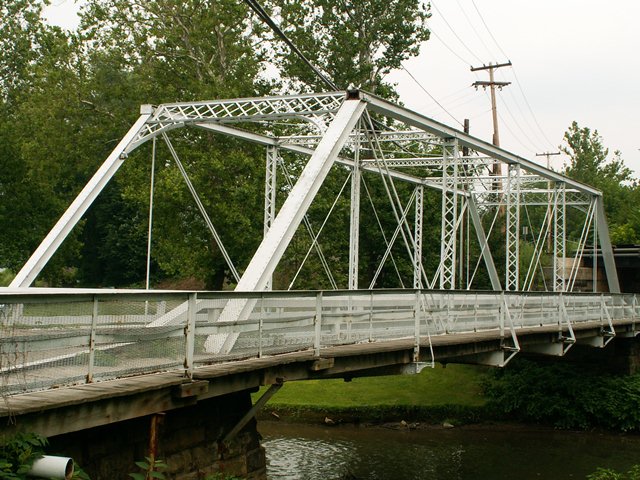We Recommend:
Bach Steel - Experts at historic truss bridge restoration.
BridgeHunter.com Phase 1 is released to the public! - Visit Now
Coal Center Bridge
Water Street Bridge

Primary Photographer(s): Nathan Holth
Bridge Documented: July 4, 2006
Coal Center: Washington County, Pennsylvania: United States
1888 By Builder/Contractor: Penn Bridge Company of Beaver Falls, Pennsylvania
1984
101.0 Feet (30.8 Meters)
107.0 Feet (32.6 Meters)
13.8 Feet (4.21 Meters)
1 Main Span(s)
627401900040010

View Information About HSR Ratings
Bridge Documentation
View Archived National Bridge Inventory Report - Has Additional Details and Evaluation
This truss bridge is located in a scenic, quiet area, with the small borough of Coal Center just to the west, and the Monongahela River to the north. This is a six panel Pratt through truss. It features some decorative detailing on the edges of the knee bracing of the portal. An 1888 date plaque survives, mounted at the end of the top chord where the end post begins. The bridge is an attractive pin connected structure, and features v-lacing on the vertical members, and lattice on the struts. If there was v-lacing or lattice under the top chord, it is gone now, since plates have been welded under the top chord. This is the most noticeable and substantial alteration to the bridge. Some of the floorbeams have been replaced as well, although original beams remain under the hip verticals. Speaking of hip verticals, this bridge has an unusual feature that tends to show up in older Penn Bridge Company bridges. There are actually two pins side by side at the top ends of the bridge, one for the top chord/endpost connection and another for the hip vertical/top chord connection.
Heading east, this bridge crosses Pike Run and then the road passes under a railroad overpass. Between this overpass and the narrow bridge, visibility is a bit on the low side, and you could see how a fender bender might happen if someone was not careful. Rather than foolishly wasting money and demolishing the bridge and overpass, Coal Center found a creative way to increase safety at this crossing. There is a sign before the bridge that reads "Sound Horn." Everyone gives a short honk of the horn before crossing the bridge, to let oncoming traffic no someone is coming. This represents a creative way to increase safety of the road, while not having to do anything real drastic. In a small community like Coal Center, this is likely more than enough to keep the bridge functional and safe.
Before reading the below review by the Historic Bridge Inventory, realize the survey was done in 1996, and so the other examples that they mention are quite likely no longer extant. A surviving 1888 truss bridge with even fair historic integrity should be considered significant today. The alteration on this bridge are either minimal, or something that could be removed as part of a bridge restoration.
Information and Findings From Pennsylvania's Historic Bridge InventoryDiscussion of Bridge The single-span, 103'-long, pin-connected Pratt through truss bridge built in 1888 is supported on ashlar abutments with wingwalls. The trusses are traditionally composed, and some of the original built up shaped floor beams remains. The three center ones have been replaced with rolled beams. There are some alterations. Cover plate has been welded to the bottom of the upper chords, and sidewalk has been added to one side by extending the floor beams. It is finished with a modern metal channel and mesh railing. The bridge is one of the oldest of its type in the county, which has a deep and varied collection of over 35 metal truss bridges from 1885 through the 1930s. Most are complete, and they represent the significance of the technology. In comparison with the county and regional population, this altered bridge is not historically or technologically significant. Discussion of Surrounding Area The bridge carries one lane of a two-lane road and a sidewalk over a stream east of the center of the borough of Coal Center. It is separated from the congested section by a vacant lot and a marina that is being developed. A railroad overpass of the Monongahela Railway is to the east. The area does not appear to have historic district potential. Bridge Considered Historic By Survey: No |
![]()
Photo Galleries and Videos: Coal Center Bridge
Bridge Photo-Documentation
Original / Full Size PhotosA collection of overview and detail photos. This gallery offers photos in the highest available resolution and file size in a touch-friendly popup viewer.
Alternatively, Browse Without Using Viewer
![]()
Bridge Photo-Documentation
Mobile Optimized PhotosA collection of overview and detail photos. This gallery features data-friendly, fast-loading photos in a touch-friendly popup viewer.
Alternatively, Browse Without Using Viewer
![]()
Maps and Links: Coal Center Bridge
Coordinates (Latitude, Longitude):
Search For Additional Bridge Listings:
Bridgehunter.com: View listed bridges within 0.5 miles (0.8 kilometers) of this bridge.
Bridgehunter.com: View listed bridges within 10 miles (16 kilometers) of this bridge.
Additional Maps:
Google Streetview (If Available)
GeoHack (Additional Links and Coordinates)
Apple Maps (Via DuckDuckGo Search)
Apple Maps (Apple devices only)
Android: Open Location In Your Map or GPS App
Flickr Gallery (Find Nearby Photos)
Wikimedia Commons (Find Nearby Photos)
Directions Via Sygic For Android
Directions Via Sygic For iOS and Android Dolphin Browser
USGS National Map (United States Only)
Historical USGS Topo Maps (United States Only)
Historic Aerials (United States Only)
CalTopo Maps (United States Only)

